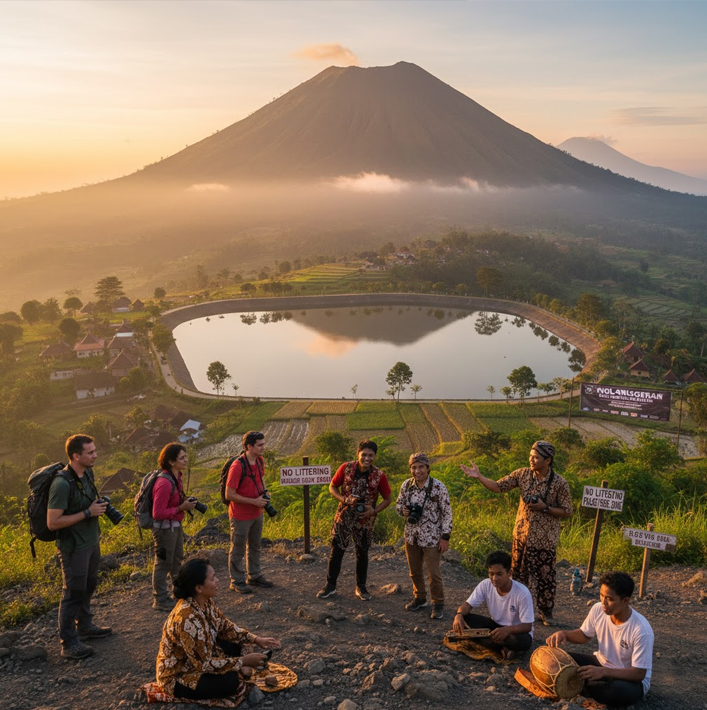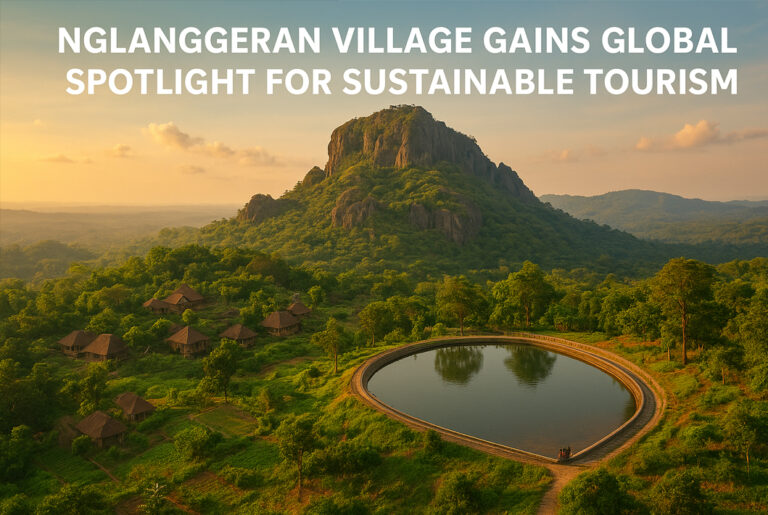Premium Biz Post – In Yogyakarta’s Gunungkidul Regency, a once-quiet farming village now shines worldwide. Nglanggeran Village Gains turning from an agricultural hub into an eco-friendly destination that blends culture, nature, and community.

Located 25 kilometers from Yogyakarta City, Nglanggeran sits near the Ancient Volcano, a rock formation millions of years old. The area’s green hills and calm lakes attract travelers seeking authentic and sustainable adventures. What makes it stand out is how locals protect their environment while sharing it responsibly with visitors.
Community-Driven Eco-Tourism
Unlike many destinations built by investors, Nglanggeran’s success started with its people. Local youth and leaders created jobs by developing community-based tourism focused on sustainability.
In the early 2000s, villagers had few income sources. Many young people left for cities, and farming productivity fell. A group of residents then decided to turn tourism into a new opportunity while preserving nature.
They built homestays, set eco-guidelines, and offered workshops on conservation. Now, over 80% of households join tourism — hosting guests, guiding treks, or teaching crafts.
Award-Winning Green Management
Nglanggeran has won several honors, such as the ASEAN Sustainable Tourism Award and the UNWTO Best Tourism Village recognition. These achievements highlight its strong environmental and social values.
Tourism income is shared fairly. Homestay fees are standardized, and a portion of profits goes to community projects like reforestation and waste recycling. About 30% of earnings support education, youth training, and cultural preservation.
This fair system helps everyone benefit, not just a few. Transparency and collaboration keep the model sustainable.
Ancient Volcano Adventure
The Ancient Volcano is the main attraction. Its hiking trails are built to prevent erosion. Guides teach visitors about local geology, plants, and animals.
From the top, travelers see Mount Merapi, Mount Lawu, and the southern coast. The view is stunning, but the real highlight is the peaceful connection with nature.
Environmental rules are strict. Plastic is banned, and littering is forbidden. Locals and visitors join cleanup and composting programs, making sustainability a shared responsibility.
Embung Nglanggeran: A Symbol of Innovation
On a nearby hill, Embung Nglanggeran — a rainwater reservoir — provides water during dry months. It was built to solve local shortages but became an eco-tourism icon.
At sunset, the water reflects golden light against rocky cliffs. It’s beautiful, yet still functions as a vital water source. The site proves that infrastructure can support both sustainability and tourism.
Cultural Revival Through Tourism
Nglanggeran’s green approach also revives local culture. Traditions once forgotten now thrive.
Visitors can join batik classes, chocolate-making workshops, and gejog lesung performances — rhythmic music using rice pounders. Festivals celebrate harvest season with organic food and local art.
Through these programs, young people learn to value their heritage, while elders proudly share their skills. Tourism connects generations and keeps traditions alive.
Read More : ”From Shell Waste to Handbags Eco-Friendly Innovation with Economic Value”
Digital Transformation
Nglanggeran embraces technology to reach global travelers. The community uses online booking, e-payments, and social media to promote their eco-village.
During the pandemic, digital tours kept the village visible. Once travel reopened, visitor numbers grew fast. This blend of tradition and tech has made Nglanggeran a model for smart eco-tourism.
Economic Growth and Equality
Tourism has changed local lives. Income rose, and unemployment dropped. Women now lead homestay operations, while youth run digital campaigns and tour services.
Village meetings ensure all decisions are made together. Everyone has a voice, and profits stay within the community. This equality builds trust and long-term commitment.
Inspiring Other Villages
Many other regions now follow Nglanggeran’s path. Delegations from Lombok, Bali, and North Sulawesi have visited to learn its model.
Indonesia’s Ministry of Tourism recognizes Nglanggeran as a National Model for Sustainable Rural Tourism. The village’s story shows how small communities can achieve global impact through local wisdom and cooperation.
As global travelers look for greener destinations, Nglanggeran stands ready to lead.
Challenges and the Road Ahead
Nglanggeran still faces challenges. More visitors mean more waste and potential strain on the ecosystem. Climate change also threatens water supply and farming.
To stay resilient, locals invest in renewable energy, reforestation, and smarter waste management. They also partner with universities and NGOs to improve eco-programs.
Their adaptability ensures the community keeps thriving while protecting its roots.
A Model for the Future
The success of Nglanggeran Village Gains Global Spotlight for Sustainable Tourism shows that sustainability and progress can go hand in hand.
When people protect nature, value culture, and innovate responsibly, they create a destination worth celebrating. Nglanggeran proves that small villages can make a global difference — one eco-friendly step at a time.



